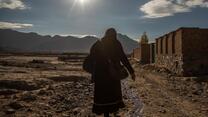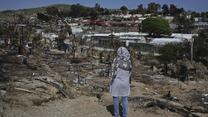
Today Members of the European Parliament will vote on the future of the EU-Africa Strategy – a watershed moment that could set the course for EU-Africa cooperation on migration for years to come.
This is an important moment for the future of EU-Africa cooperation, which has become all the more critical in light of COVID-19 – the wide-ranging economic, social and political impacts of which continue to reverberate across the world.
As the international community strives to achieve the Sustainable Development Goals by 2030 – intended to lift people and the planet out of poverty and towards health and prosperity – people on the move, including refugees, asylum seekers and other migrants, and the women and girls amongst them in particular, are at grave risk of slipping through the gaps. Bold leadership and meaningful partnerships are needed to prevent this from happening, and build reinvigorated cooperation on migration that ensures no one is left behind.
The International Rescue Committee recommends five key areas in which the EU must enhance its cooperation on migration and forced displacement with Africa:
Legal migration
Migration patterns are culturally and historically woven into the social fabric of African societies.
Most of the people IRC has supported along the Central Mediterranean Route in Niger and Libya since 2017 report that they move because they feel they have no other choice. Unemployment, climate change, and erosion of resources have led thousands to flee in search of a better future elsewhere.
Despite the securitisation policies and border management along the route to Europe - and now the global pandemic - migrants have not abandoned hope. In the absence of regular pathways, they are taking new routes, often more costly and dangerous than the ones they have been taking for centuries.
There is an urgent need to expand safe and regular migration pathways between Africa and Europe, with increased humanitarian admission programmes, private sponsorships, educational visas, family reunifications, and labour migration at all skill levels.

Resettlement
Thousands of refugees and migrants continue to risk their lives on dangerous journeys from sub-Saharan Africa to North Africa. The gap between the needs and the reality of resettlement places along the Central Mediterranean route is abundantly clear.
It is estimated that approximately 349,710 individuals are in need of resettlement in countries along the Central Mediterranean route in 2021. These needs are almost 8% higher than the needs projected for 2020 (324,754) and represent 24% of the total projected global resettlement needs for 2021. Only 3,834 departures were registered in 2020 across the countries of asylum in the CMR.
It is essential that EU member states fulfil their outstanding 2020 resettlement commitments, and make new and additional pledges of at least 35,000 places for 2021, taking into account the Central Mediterranean priority situation.
Continued funding and increased pledges must also be established under the Emergency Transit Mechanism (ETM) which is virtually the only legal option for refugees and asylum seekers to leave Libya by being evacuated to Niger and Rwanda.

Cooperation with third countries
The EU must enhance its cooperation with third countries to better ensure that human rights of migrants and refugees are upheld. Rather than focusing disproportionately on policies that deter people from reaching the EU, member states must strengthen migration policies that support regional migration in Africa, and provide funding and capacity building to regional initiatives that enhance the protection of migrants, including national legal frameworks.

Returns and reintegration
The challenges faced by returnees are complex. Many people the IRC has encountered through its programming say they are ‘stuck in transit”, unable to return to their countries of origin due to stigma, financial and social debts, shame and marginalisation opting instead to hold on in countries of transit where assistance is limited and does not adequately fulfil their needs.
It is essential to establish alternative, more flexible, mechanisms for migrants who are ready to abandon irregular journeys, but are not yet ready to return home. This could entail third country temporary resettlement as one viable option. Sustained support that goes beyond humanitarian assistance and that targets migrants who are either stuck in transit, or are lingering with the hopes to continue onwards is essential to respond to people’s actual needs.
The EU needs to scale up reintegration schemes through an integrated approach that promotes employment opportunities upon return to their country of origin, strong psychological support to address the long-term needs of migrants, and social cohesion programmes for communities of origin and transit to tackle integration along the route and barriers to return.

Funding
Migration is a phenomenon with a long history that is here to stay. The EU needs to adapt its financing tools to reflect this reality.
This will require a greater focus on the potential of human mobility to drive development outcomes, and a robust shift away from the predominantly short-term approach to humanitarian financing towards the provision of multi-year, flexible funding.
The EU must also urgently shift away from a logic that makes funding conditional on migration management objectives, and clashes with the primary purpose of development assistance.




